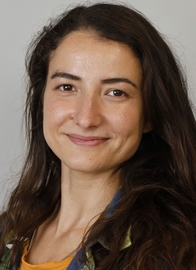Research statement
Patients diagnosed with recessive dystrophic epidermolysis bullosa (RDEB) are at high risk of developing an aggressive form of squamous cell carcinoma. Given the limited treatment options we are pursuing novel therapeutic approaches with a focus on drug repurposing, a strategy that uses drugs that are already available and have been extensively tested for safety. Specifically, this preclinical project aims to investigate the efficacy of statins – a widely used class of drugs to manage cholesterol levels - in the treatment of squamous cell carcinoma. We want to investigate whether statins can slow or stop tumor growth and uncover the molecular mechanisms involved at the cellular level. Ultimately, this project will help us to further optimize our computational drug screening program as well as our models for testing potential cancer drugs to develop safe new treatment options for people living with RDEB skin cancer.
Personal interests
I love climbing, running, hiking and spending time in the nature
Curriculum Vitae Daniela Stoica-Andrei
Professional career
Since 2024
Postdoc at the EB House Austria
Investigation of the potential of repurposing statins for the treatment of highly aggressive RDEB tumors.
2018-2023
Ph.D Researcher in Experimental dermatology, UMCG Groningen, The Netherlands
Investigation of the molecular phenotypes caused by pathogenic variants in genes that encode the desmosomal protein desmoplakin and the desmosome-associated protein tuftelin-1.
Education
2018-2023
PhD studies Rijksuniversiteit, Groningen, The Netherlands
Subject of PhD thesis: Traditional and novel genes associated with skin fragility syndrome. Functional investigation of pathogenic variants in desmoplakin and tuftelin 1.
Supervisors: Prof. P. van der Meer; Prof. B. Horvath; Dr. M.C. Bolling
2015-2017
Master studies: Biomedical Sciences at Rijksuniversiteit, Groningen
Research project in experimental gynecology- Investigation of the microRNA profiles in cumulus and mural granulosa cells from human pre-ovulatory follicles
Research project in diabetes- Investigation of TR4 nuclear receptor in glucose metabolism
Awards and Fellowships
2019 BEST PRESENTATION- NVED Experimental dermatology National Congress
2018 BEST PRESENTATION- EADV / ESDR international summer research workshop
Additional qualifications
VMT microbiological Safety Certificate
Laboratory mice/rat article 5 Certificate
Cellular Immaging light Certificate
Original articles
- Daniela Andrei; Jeroen Bremer; Duco Kramer; Albertine M. Nijenhuis; Marije van der Molen; Gilles F. H. Diercks; Peter C. van den Akker; Mathilde C. S. C. Vermeer; Peter van der Meer; Maria C. Bolling. Epidermal growth factor receptor inhibition leads to cellular phenotype correction of DSP‐mutated keratinocytes. Experimental Dermatology. 2024-March. 33(3): e15046. https://doi.org/10.1111/exd.15046
- Daniela Andrei*, Annemieke J.M.H. Verkerk*, Mathilde C.S.C. Vermeer, Duco Kramer, Marloes Schouten, Pascal Arp, Joost A.M. Verlouw, Hendri H. Pas, Hillegonda J. Meijer, Marije van der Molen, Silke Oberdorf-Maass, Miranda Nijenhuis, Pedro H. Romero-Herrera, Martijn F. Hoes, Jeroen Bremer, Johan A. Slotman, Peter C. van den Akker, Gilles F.H. Diercks, Ben N.G. Giepmans, Hans Stoop, Jasper J. Saris, Ans M.W. van den Ouweland, Rob Willemsen, Jean-Jacques Hublin, M. Christopher Dean, A. Jeannette M. Hoogeboom, Herman H.W. Silljé, André G. Uitterlinden, Peter van der Meer, Maria C. Bolling. Disruption of TUFT1, a Desmosome-Associated Protein, Causes Skin Fragility, Woolly Hair, and Palmoplantar Keratoderma. Journal of Investigative Dermatology. 2024; 284-295.e16. https://doi.org/10.1016/j.jid.2023.02.044
- Mathilde C. S. C. Vermeer, Daniela Andrei, Duco Kramer, Albertine M. Nijenhuis, Yvonne M. Hoedemaekers, Helga Westers, Jan D. H. Jongbloed, Hendri H. Pas, Maarten P. van den Berg, Herman H. W. Silljé, Peter van der Meer, Maria C. Bolling. Functional investigation of two simultaneous or separately segregating DSP variants within a single family supports the theory of a dose-dependent disease severity. Exp Dermatol. 2022- June. 31(6):970-979. https://doi.org/10.1111/exd.14571
- Mathilde C.S.C. Vermeer, Herman H.W. Silljé, Hendri H. Pas, Daniela Andrei, Peter van der Meer, Maria C. Bolling. Keratin 14 Degradation and Aging in Epidermolysis Bullosa Simplex due to KLHL24 Gain-of-Function Variants. Journal of Investigative Dermatology. 2022. 142, 2271e2274. https://doi.org/10.1016/j.jid.2021.12.027
- Daniela Andrei, Roland A. Nagy, Aafke van Montfoort, Uwe Tietge, Martijn Terpstra, Klaas Kok, Anke van den Berg, Annemieke Hoek, Joost Kluiver, Rogier Donker. Differential miRNA Expression Profiles in Cumulus and Mural Granulosa Cells from Human Pre-ovulatory Follicles. 2018- September. MicroRNA, 8(1) 61-67. https://doi.org/10.2174/2211536607666180912152618
- Ruxandra A. Nagy, Aafke P. A. van Montfoort, Henk Groen, Irene Homminga, Daniela Andrei, Rima H. Mistry, Josephine L. C. Anderson, Annemieke Hoek & Uwe J. F. Tietge. Anti-oxidative function of follicular fluid HDL and outcomes of modified natural cycle-IVF. Scientific Reports. 2019- September. 6;9(1):12817. https://doi.org/10.1038/s41598-019-49091-3
- Ruxandra A. Nagy, Harry Hollema, Daniela Andrei, Angelika Jurdzinski, Folkert Kuipers, Annemieke Hoek, Uwe J.F. Tietge. The Origin of Follicular Bile Acids in the Human Ovary. The American Journal of Pathology. 2019. 189(10): 2036-2045. https://doi.org/10.1016/j.ajpath.2019.06.011
Reviews
- Daniela Andrei*, Vermeer, Mathilde C. S. C.*, Luisa Marsili, J. Peter van Tintelen, Herman H. W. Silljé, Maarten P. van den Berg, Peter van der Meer, and Maria C. Bolling. 2022. Towards a Better Understanding of Genotype–Phenotype Correlations and Therapeutic Targets for Cardiocutaneous Genes: The Importance of Functional Studies above Prediction. International Journal of Molecular Sciences. 2022, 23(18), 10765. https://doi.org/10.3390/ijms231810765
Funding
The current “statins in RDEB-SCC” project is funded by DEBRA UK and DEBRA France (GR000040). Preliminary data generation was funded by Paracelsus Medical University (PMU, 2022-SEED-019-Zauner) as well as DEBRA Austria.
Information about the Project on the DEBRA UK Website
News article about the project:
